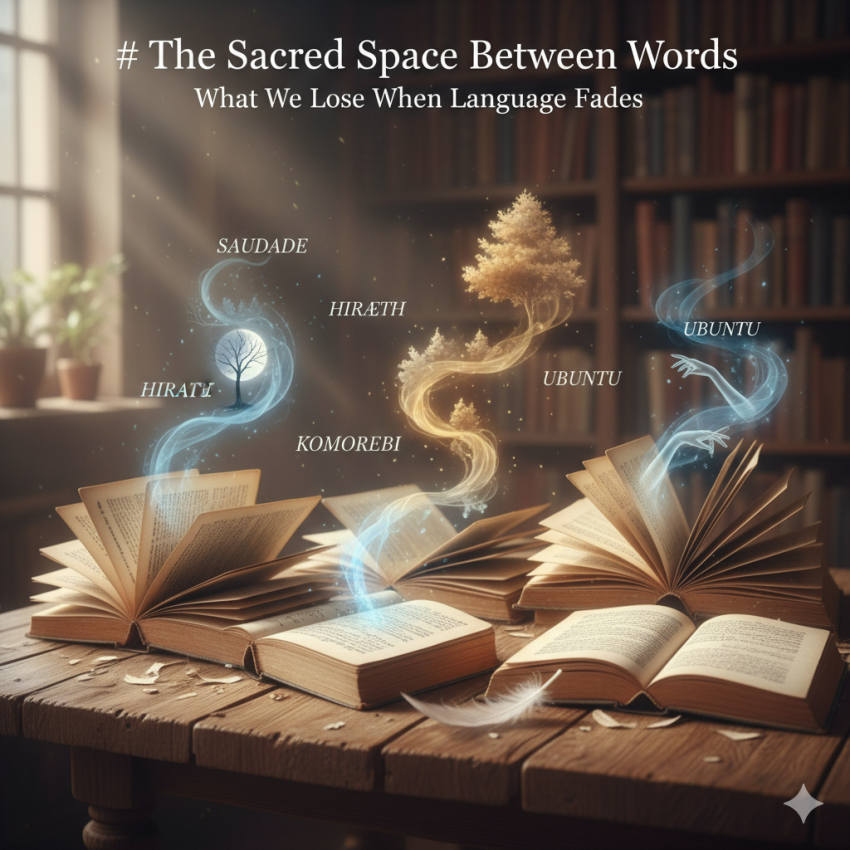What We Lose When Language Fades
There’s a particular ache that comes with discovering a word you never knew existed—especially when you realize it once described something you’ve felt but could never name. Last week, I stumbled upon saudade, the Portuguese word for a deep, nostalgic longing for something absent, something that may never return. As I let the word settle in my mind, I wondered: how many other feelings, experiences, and ways of being have we lost simply because the words that held them have slipped away?
Language is more than communication—it’s the architecture of our inner world. When words disappear, they take pieces of human understanding with them. Each lost word is a doorway that closes, a way of seeing that grows dim, a fragment of collective wisdom that returns to silence.
The Words We’ve Forgotten
Consider hiraeth, the Welsh word for homesickness tinged with grief for a home that no longer exists, or perhaps never was. Or komorebi, the Japanese term for sunlight filtering through leaves—a phenomenon we all witness but for which English offers no single, sacred word. These aren’t just vocabulary; they’re entire ways of experiencing reality.
When we lose such words, we lose more than definitions. We lose invitations to notice, to feel, to connect with dimensions of existence that someone, somewhere, once thought important enough to name. The absence of these words in our daily language doesn’t just reflect linguistic change—it reveals what we’ve stopped paying attention to, what we’ve ceased to value.
The Spiritual Weight of Words
In many spiritual traditions, words carry creative power. “In the beginning was the Word,” the Gospel of John tells us. Hindu philosophy speaks of om as the primordial sound from which all creation emerges. Indigenous cultures worldwide hold that to name something is to call it into being, to establish relationship with it.
When we examine the words that have vanished from common use, we’re looking at a kind of spiritual archaeology. What does it mean that we no longer commonly speak of ubuntu—the African philosophy that “I am because we are”? What have we lost by forgetting meraki, the Greek word for doing something with soul, creativity, and love?
These lost words point to lost ways of being. They’re breadcrumbs leading back to wisdom we once held collectively, reminders of aspects of human experience we’ve allowed to fade not just from our vocabulary, but from our daily consciousness.
The Silence That Speaks
Sometimes the most profound communication happens in the spaces between words—in the pause before we speak, in the breath we take when searching for exactly the right expression. These moments of reaching, of seeking, remind us that language is always incomplete, always striving to bridge the unbridgeable gap between one consciousness and another.
There’s something sacred in this incompleteness. It keeps us humble, keeps us reaching, keeps us aware that our words are gestures toward truth rather than truth itself. The words we’ve lost remind us of this mystery—they show us that there are always more ways to understand, more ways to be, than our current vocabulary allows.
Finding What Was Never Lost
But perhaps the real question isn’t what we’ve lost, but what remains available to us in each moment we choose to speak with intention. Every conversation is an opportunity to reclaim some of this lost wisdom, to resurrect forgotten ways of connecting.
When we pause before speaking—really pause—we enter the same sacred space that all words emerge from. In that space, we can choose words that heal rather than harm, that connect rather than divide, that honor rather than diminish. We can remember that our words don’t just describe reality; they participate in creating it.
The next time you find yourself searching for the right word, stay in that search a moment longer. Notice the feeling of reaching for something just beyond your current vocabulary. That reaching itself is a form of prayer, a recognition that there’s always more to discover, more to understand, more to become.
A Living Relationship
Our relationship with language is not static—it’s a living conversation between what we’ve inherited and what we choose to nurture forward. While we may have lost certain words, we haven’t lost our capacity to create new ones, to breathe life into forgotten ones, to use whatever words we have with greater consciousness and care.
Perhaps the most important lost word is the one we haven’t thought to look for yet—the one that would perfectly capture the feeling of reading these words right now, of considering your own relationship with language, of recognizing the sacred responsibility we all carry as speakers and listeners, as the temporary custodians of this miraculous gift we call human communication.
What words are you carrying forward? What words are you choosing to bring back to life? In the end, the sacred space between words is also the space between us—and every word we speak is a bridge we’re building across that space, one careful syllable at a time.

